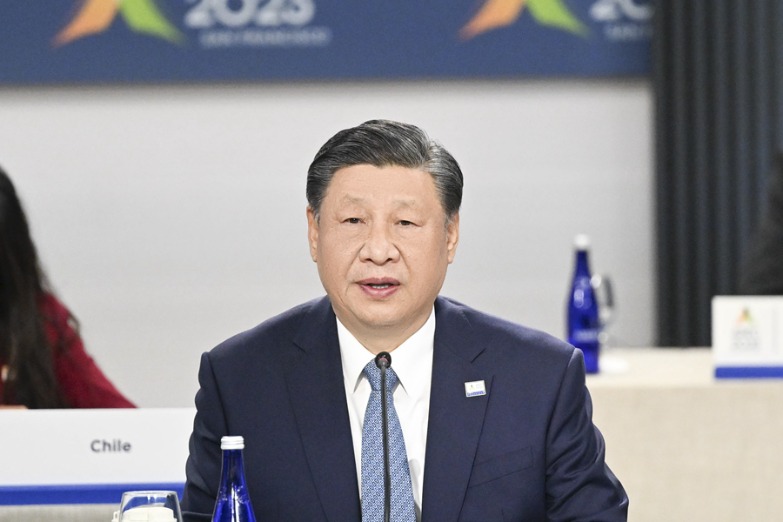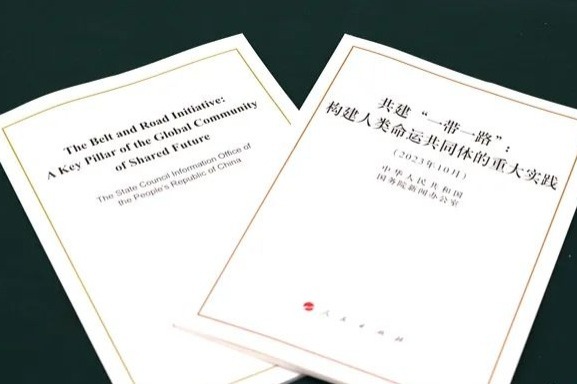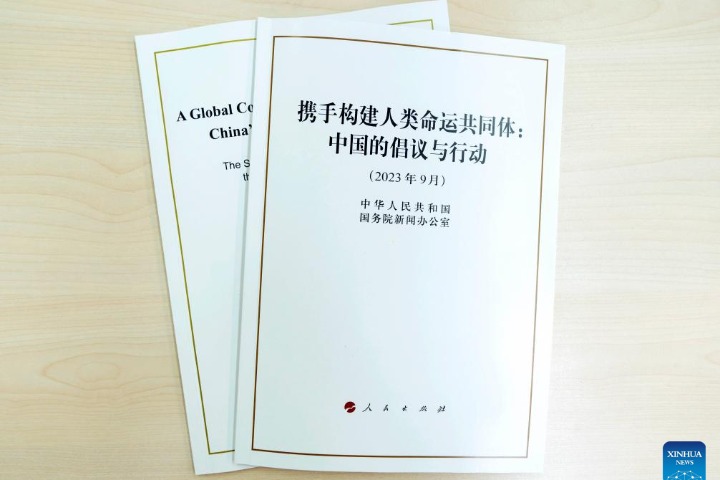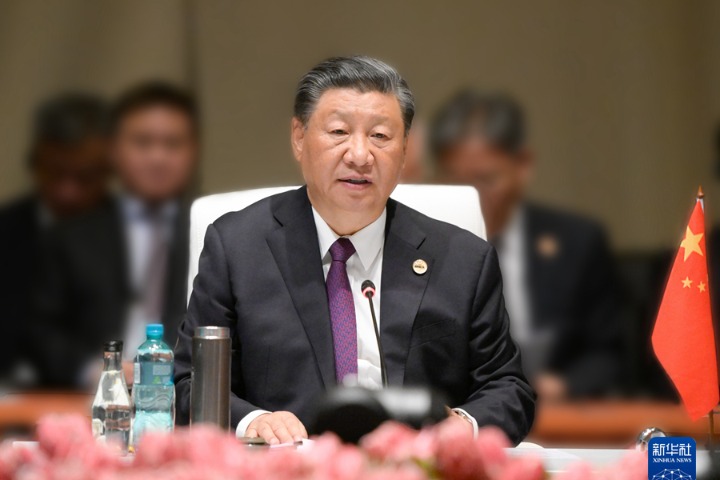新疆的职业技能教育培训工作(双语全文)
新华网 2019-08-16 14:38

三、教育培训的内容
III. Content of Education and Training
为有效遏制宗教极端主义蔓延扩散、暴力恐怖案(事)件多发频发势头,新疆依法开展教育培训工作,在一些区、县设立教培中心。
In order to effectively contain and systematically remedy the dissemination of religious extremism and frequent terrorist incidents, Xinjiang has set up vocational education and training centers in some prefectures and counties.
教培中心属于学校性质。针对新疆反恐、去极端化的实际需要,设置了以学习国家通用语言文字、法律知识、职业技能以及去极端化为主要内容的教学课程。
These centers are education and training institutions in nature. To meet the needs of fighting terrorism and extremism, these centers deliver a curriculum that includes standard spoken and written Chinese, understanding of the law, vocational skills, and deradicalization.
针对学员使用国家通用语言文字普遍水平低的问题,开展国家通用语言文字培训。教培中心开展国家通用语言文字培训有充分的宪法和法律依据。《中华人民共和国宪法》以及《中华人民共和国民族区域自治法》《中华人民共和国国家通用语言文字法》均保障各民族有使用和发展自己的语言文字的自由。同时,《中华人民共和国宪法》和《中华人民共和国国家通用语言文字法》也规定,国家推广全国通用的普通话,公民有学习和使用国家通用语言文字的权利,国家为公民学习和使用国家通用语言文字提供条件。教培中心充分保障宪法赋予公民的学习和使用国家通用语言文字的权利,为学员提供学习条件。安排有教师资格的国家通用语言专业教师,使用专门为学员编写的教材,按照普通学校授课方式,快速提升学员使用国家通用语言文字的能力。国家通用语言文字的培训,是在尊重少数民族使用本民族语言文字权利前提下进行的,目的在于增强掌握和使用国家通用语言文字的能力,使学员获得学习科学文化知识、职业技能、外出经商务工、与其他民族群众交流、适应现代生活的语言工具,而不是要剥夺或者限制使用、发展本民族语言文字的权利。
To remedy their lack of proficiency in spoken and written Chinese, tailored language programs are provided to trainees. The education and training centers have solid constitutional and legal authority to conduct such programs. The Constitution of the People’s Republic of China, the Law of the People’s Republic of China on Regional Ethnic Autonomy and the Law of the People’s Republic of China on the Standard Spoken and Written Chinese Language protect the freedom of all ethnic groups to use and develop their own spoken and written languages. At the same time, the Constitution and the Law of the People’s Republic of China on the Standard Spoken and Written Chinese Language specify that the state promotes the nationwide use of Putonghua, that all citizens have the right to learn and use the standard spoken and written Chinese language, and that the state provides citizens with the conditions to enable them to do so.
The education and training centers fully guarantee citizens’ right to learn and use standard spoken and written Chinese conferred by the Constitution, and provide trainees with the facilities required for their studies. They employ qualified teachers, using textbooks compiled especially for the trainees, teaching in the same way as in regular schools in order to rapidly improve their ability in the use of standard spoken and written Chinese. Improving the trainees’ command of standard spoken and written Chinese helps them to learn about science and technology, acquire vocational skills, seek work in other locations, communicate with other ethnic groups, and adapt better to life in modern society, subject to the condition that their right to use their own ethnic spoken and written languages is respected. There is no intention to deprive or limit the trainees’ right to use and develop their own ethnic languages.
针对学员普遍缺乏法治意识,开设法律知识课程。教培中心将学习法律知识作为培养学员增强国家意识、公民意识、法治意识的关键环节。聘请法官、检察官、律师等讲授《中华人民共和国宪法》《中华人民共和国民族区域自治法》《中华人民共和国刑法》《中华人民共和国民法总则》《中华人民共和国婚姻法》《中华人民共和国妇女权益保障法》《中华人民共和国未成年人保护法》《中华人民共和国劳动法》《中华人民共和国劳动合同法》《中华人民共和国教育法》《中华人民共和国职业教育法》《中华人民共和国反恐怖主义法》《中华人民共和国治安管理处罚法》和《新疆维吾尔自治区去极端化条例》《新疆维吾尔自治区实施〈中华人民共和国反恐怖主义法〉办法》《新疆维吾尔自治区宗教事务条例》等法律法规。通过学习,使学员增强对公民权利义务的认识,建立平等享有权利、履行公民义务的观念,自觉遵守国家宪法法律,按照宪法法律赋予的权利和义务行事。
To remedy a lack of understanding of the law, the education and training centers present legal courses, which is taken as the key link to strengthen national, civic and legal awareness. Judges, procurators and lawyers are invited to give lectures on laws and regulations, including the Constitution, the Law of the People’s Republic of China on Regional Ethnic Autonomy, Criminal Law of the People’s Republic of China, General Provisions of the Civil Law of the People’s Republic of China, Marriage Law of the People’s Republic of China, Law of the People’s Republic of China on the Protection of Women’s Rights and Interests, Law of the People’s Republic of China on the Protection of Minors, Labor Law of the People’s Republic of China, Labor Contract Law of the People’s Republic of China, Education Law of the People’s Republic of China, Vocational Education Law of the People’s Republic of China, Counter-terrorism Law of the People’s Republic of China, Public Security Administration Punishments Law of the People’s Republic of China, Regulations of the Xinjiang Uygur Autonomous Region on Deradicalization, Measures of the Xinjiang Uygur Autonomous Region on Implementing the Counter-terrorism Law of the People’s Republic of China, and Regulations of the Xinjiang Uygur Autonomous Region on Religious Affairs. Through their studies, the trainees have developed a better understanding of their civil rights and obligations, a realization that they have the same entitlement to these rights and obligations as others, and an acceptance that they must abide by the Constitution and laws and act in accordance with the rights and obligations they confer.
针对学员缺乏职业技能、就业困难的问题,开展职业技能培训。教培中心将学习职业技能作为提升学员就业能力的重要途径,根据当地需求和就业条件,设置服装鞋帽加工、食品加工、电子产品组装、排版印刷、美容美发、电子商务、汽车维修、建筑装饰、畜牧养殖、果树栽培、保健推拿、家政服务、手工艺品制作、插花、地毯编织、绘画、乐器演奏、舞蹈演艺等培训课程,对其中有愿望有条件的学员进行多技能培训,确保学员结业后能够较为熟练地掌握1-2门职业技能。教培中心注重将课程学习与实训操作相结合,提高学员实际操作能力。实训操作是实践教学,不是在工厂务工,不是在企业就业,更不是强制劳动。
To remedy lack of occupational skills and employment difficulties, vocational skills training programs are provided. The education and training centers regard vocational skills as an important channel to improve the trainees’ employability. Based on local demand and employment opportunities, the courses they present include garment making, food processing, assembly of electronic products, typesetting and printing, hairdressing and beauty services, e-commerce, auto maintenance and repair, interior design and decoration, livestock breeding, pomiculture, therapeutic massage, household services, handicrafts, flower arrangement, rug weaving, painting, and the performing arts such as music and dance. Eligible trainees who are willing to learn are offered training in more than one skill to ensure they are employable in the jobs market upon completing their study at the centers. The education and training centers combine course learning with practical training to improve the trainees’ operational skills. Practical training is conducted in classes rather than through employment in factories or enterprises, or obligatory labor.
针对学员不同程度地受宗教极端主义影响和控制的问题,教培中心将去极端化贯穿全过程。通过分阶段学习法律法规、民族宗教政策和宗教知识,揭露恐怖主义、宗教极端主义的危害,使学员全面准确了解国家宗教信仰自由政策,深刻认识到什么是合法宗教活动、什么是非法宗教活动、什么是宗教极端主义,真正明白宗教极端主义完全违背了宗教教义,努力使学员认清恐怖主义、宗教极端主义的罪恶本质和严重危害,摆脱其影响和控制。教育培训从不干预学员信仰自由,从未进行改变学员宗教信仰的教学活动。
As trainees have fallen under the influence and control of religious extremism to a greater or lesser extent, the centers integrate deradicalization into the whole process of education and training. Through step-by-step teaching of laws and regulations, policies on ethnic and religious affairs, and religious knowledge, and by exposing the damage caused by terrorism and religious extremism, the centers give trainees a full and accurate understanding of the national policy of freedom of religious belief. In order to rehabilitate the trainees, these courses teach the trainees to distinguish between lawful and unlawful religious activities, understand how religious extremism runs counter to religious doctrine, and realize the evil nature and serious harm of terrorism and religious extremism so that they can eventually break free from the influence and control of terrorism and religious extremism. Education and training at the centers never interferes in the trainees’ freedom of religious belief and the centers have never made any attempts to have the trainees change their religious beliefs.
四、学员的基本权利得到保障
IV. Protection of Trainees’ Basic Rights
尊重和保障人权,是中国宪法规定的基本原则,并在中国的各项法律制度和中国政府开展的各项工作中得到充分体现。新疆开展教培工作,是政府依法采取的一项社会治理措施,旨在保障人民生命安全,保障公民基本权利不受侵犯。在开展教培工作过程中,教培中心严格贯彻落实宪法和法律规定,保障参与培训学员的基本权利不受侵犯。
It is a basic principle, enshrined in the Constitution of China, prescribed by its laws, and demonstrated by the efforts of the Chinese government, to respect and protect human rights. The education and training in Xinjiang is a social governance measure taken by the government, in accordance with the law, to protect the lives and basic civil rights of citizens. In organizing the training programs, the education and training centers strictly follow the provisions of the Constitution and the law to prevent any violation of the basic rights of trainees.
教培工作根本不是什么限制、剥夺人身自由的措施,而是依法采取的帮助学员摆脱恐怖主义、宗教极端主义束缚的重要措施,是实现人的思想解放、素质提升和更好发展之举。
Education and training is not a measure to limit or circumscribe the freedom of the person. Rather it is an important measure to help trainees to break free from ideas of terrorism and religious extremism. It is an attempt to help the trainees to emancipate their minds, improve themselves and their future prospects.
中国法律明文禁止任何基于地域、民族、宗教等理由的歧视性做法,这一规定在新疆得到了切实执行。教培中心确定教育挽救对象的唯一标准是是否有过恐怖主义、宗教极端主义违法或犯罪行为,与其所在的地区、所属的民族和所信仰的宗教毫无关系。
The law of China prohibits any discrimination based on region, ethnicity, religion and other grounds. This is implemented strictly in Xinjiang. The only criterion for education at the centers is whether the trainee has been convicted of unlawful or criminal acts involving terrorism and religious extremism. It has nothing to do with their region, ethnicity or religion.
学员在教培中心学习过程中的人身自由得到依法保障。教培中心充分保障学员的人格尊严不受侵犯,严禁以任何方式对学员进行人格侮辱和虐待。教培中心实行寄宿制管理,学员可定期回家,有事请假,学员有通信自由。
The personal freedom of trainees at the education and training centers is protected in accordance with the law. The centers guarantee that trainees’ personal dignity is inviolable, and prevent any insult or abuse in any manner. They employ a residential education model which allows trainees to go back home on a regular basis and ask for leave to attend personal affairs. The trainees also enjoy the freedom of correspondence.
在教培中心,各民族的风俗习惯和使用本民族语言文字的权利都得到充分保障。教培中心各项规章制度、课程表、食谱等均使用国家通用语言文字和当地少数民族语言文字。教培中心充分尊重和保障不同民族学员的风俗习惯,免费提供种类繁多、营养丰富的清真饮食。
The customs of all ethnic groups and the right to use their spoken and written languages are fully protected at the centers. The regulations, curriculum, and menus at the centers all use local ethnic languages as well as standard Chinese. The customs of all ethnic groups are fully respected and protected, and a variety of nutritious Muslim food is provided free of charge.
教培中心尊重学员的宗教信仰自由。《宗教事务条例》规定,禁止在宗教院校以外的学校及其他教育机构传教、举行宗教活动、成立宗教组织、设立宗教活动场所。教培中心在管理上实行教育与宗教相分离,学员不得在校内组织、参加宗教活动,但信教学员回家时可以自主决定是否参与合法宗教活动。
The education and training centers respect the trainees’ freedom of religious belief. The Regulations on Religious Affairs prohibit preaching religion, holding religious activities, establishing religious organizations, and setting up religious activity sites in schools and educational institutions other than religious institutions. The centers practice separation of education and religion in management, which means trainees should not organize or take part in religious activities there, but they can decide on their own whether to do so on a legal basis when they get home.
教培中心配备双语教师、辅导员、医生和后勤服务管理人员等,保障学员正常学习生活。教培中心生活设施齐全,室内冬天有暖气、夏天有空调或风扇,宿舍有电视,浴室免费对学员开放。设置医疗室,每天24小时免费向学员提供医疗服务,小病可在医务室就诊治疗,重症急症可快速送医院救治。
The education and training centers employ bilingual teachers, instructors, doctors and logistics and managerial staff to ensure that the trainees can study and lead a normal life. They have well-equipped facilities – central heating in winter, air conditioners and electric fans in summer, TVs in the dormitory, and bathrooms. They also have free 24-hour medical facilities available to trainees, capable of treating minor ailments. In the case of major and acute illnesses, trainees will be sent to hospital.
教培中心充分尊重学员各方面精神文化生活需求,有室内外体育文化活动场所,经常举办丰富多彩的文体娱乐活动。设置图书阅览室,方便学员读书学习。设置法律咨询室,帮助学员及时解决法律层面的困难和疑问。设置心理咨询室,提供心理咨询服务,关心学员心理健康。所有学员均享受养老、医疗等社会保险,免费参加全民健康体检。
The education and training centers fully respect the spiritual and cultural needs of trainees. A wealth of regular recreational activities are held at their indoor and outdoor sports and cultural venues. They have reading rooms for trainees to read and study, legal counseling rooms to address their problems and difficulties concerning legal affairs, and mental counseling rooms to provide relevant services and care for their mental health. All trainees are included in public pension and medical insurance schemes, and are entitled to free health examination.
为解除教培学员的后顾之忧,新疆各级政府对教培学员家庭平等落实社会保障、教育医疗、脱贫攻坚等各项优惠政策,帮助学员亲属解决生产、生活、就业、就学、就医等方面的实际困难,增强了学员参加学习培训的动力。
In order to relieve them of family worries, the authorities at all levels of Xinjiang treat trainees’ families on an equal footing in terms of preferential policies in social security, education, medical service, and poverty elimination, and help their families and relatives to address problems in work, daily life, employment, education and medical services, thus allowing them to focus more attention on their education and training.

















 英语点津微信
英语点津微信 双语小程序
双语小程序